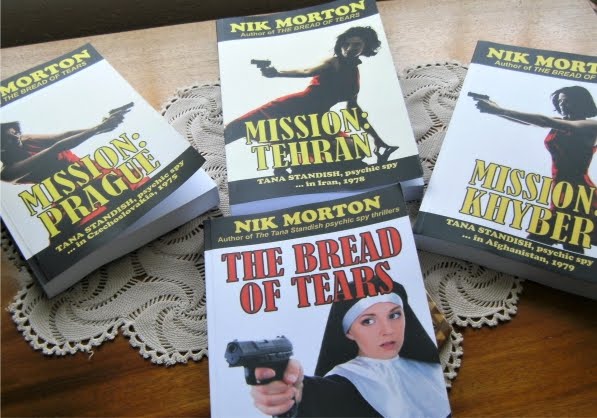I’m sure we’ve all seen examples such as these:
‘What a joke that was,’ he smiled.
‘I’m not too sure about that,’ he shrugged.
‘All right,’ he nodded.
Yes, these appear even in the prose of best-selling
authors; no names, but you’ve come across them. It doesn’t mean they’re right.
In fact, they’re using lazy short-hand. What they mean, invariably, is ‘he said
and smiled.’ And other variants. I point out that you’ll find it difficult to
smile and speak at the same time, anyway, in Write a western in 30 Days (p124).
Employing the above standby words too often is both
lazy and unhelpful to the reader. The attributions ‘he said’ and ‘she said’ are
virtually invisible to the reader so don’t derail the narrative flow; those
shrugs, nods and smiles are virtually invisible also, when they’re being used
as attribution.
‘What a joke that was.’ He smiled.
This is better. It puts emphasis on his action –
smiling.
However, there have to be other ways of conveying
his feelings. Smiling implies happiness. It so happens that a book published in
2012 can offer guidance. The Emotion
Thesaurus, a writer’s guide to character expression (by Angela Ackerman and
Becca Puglisi) provides 75 emotion entries that list body language, thoughts
and visceral responses for each type of emotion, from Adoration to Worry.
So our example could read,
‘What a joke that was.’ His eyes sparkled.
Or:
‘What a joke that was.’ He bounced on his toes.
It just depends on the depth of the emotion at that
time. And that’s just a physical response. There are internal sensations (when
you’re in that POV) – say, a feeling of breathlessness. The section also offers
the cues of suppressed happiness.
A writer writes to affect the reader, even if only
to entertain, but usually you’re also creating tension, anger, fear and perhaps
tears – an emotional response which can only be evoked through experiencing the
emotions of the characters.
I’ll quote from the Emotion Thesaurus: ‘All
successful novels, no matter what genre, have one thing in common: emotion. It
lies at the core of every character’s decision, action and word, all of which
drive the story. Without emotion, a character’s personal journey is pointless.
Stakes cease to exist… readers pick up a book to have an emotional experience.
They read to connect with characters who provide entertainment and whose trials
may add meaning to their own life journeys.’
At the risk of getting over-emotional, I believe
that authors Angela Ackerman and Becca Puglisi have provided a great service to
writers by writing the Emotion Thesaurus, which is for all writers, not
simply budding scribes.


























9 comments:
The Emotion Thesaurus. Noted. And, as always, thanks for the tips, Nik.
Pleased that you're accessing them, David.
In online critique groups poor dialog formatting is the #1 mistake first-timers make by using that short-hand. I'm not sure where we all learned it from because when you actually think it over you can see how wrong it is.
I purchased this book a few months ago, Nik, and I love it. It's great to use along with my Flip Dictionary by Barbara Ann Kipfer, Ph.D.
Good to hear, Charliann. Like any aid, it's a case of using it judiciously and don't become a slave to it; best at the rewrite stage, so you don't interrupt the narrative flow looking for a better emotional term or cue.
Pat, it is curious how 'he smiled' became an attribution; yet it crops up all over the place now. Let's fight back!
Hi, Nik! I'm so glad you're finding The Emotion Thesaurus useful. We wrote it because we were struggling with the same thing, so it's really nice to hear that it's fulfilling it's purpose. And thanks for spreading the word!
Thanks for popping in, Becca. Anyone reading this, do drop over on a regular basis to the bookshelf muse blog. Lots of good advice can be found there.
Very good suggestions in this piece.
Thank you, Anon.
Post a Comment